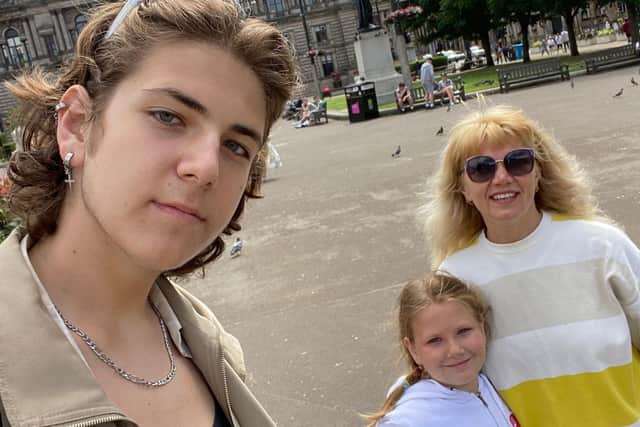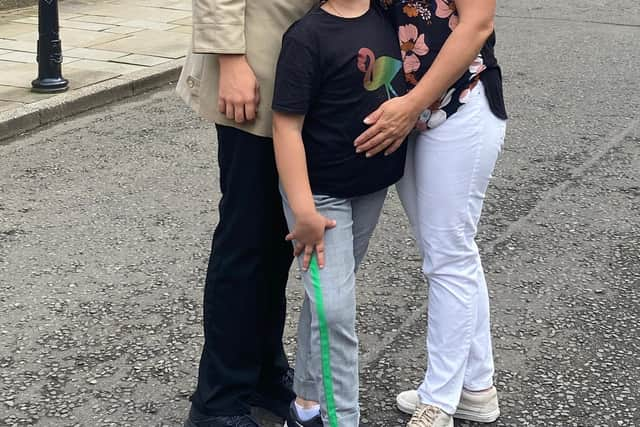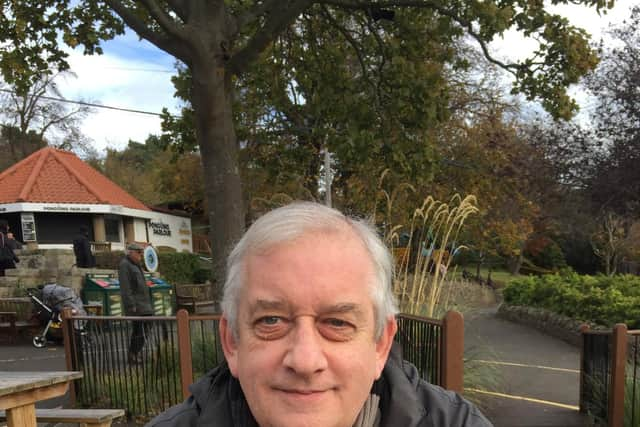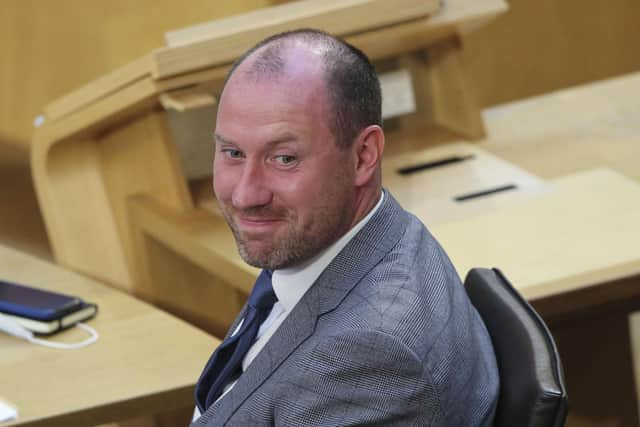Insight: the downfall of the Scottish Government's ambitious Super Sponsor scheme for Ukrainian refugees
The young family, who fled their home near the Ukrainian city of Kherson the day after the Russian invasion in February, had been staying in difficult conditions in a single room in Poland, where they were sharing a bathroom with broken plumbing with six other families. There, Ms Kolomenska had to get up at 4.30am to start one of three cleaning jobs she had been forced to take to support her children. Her husband and oldest son, Peter, had to stay behind in Ukraine.
The family had waited two months for their documents to be processed under the UK-wide Homes for Ukraine scheme since first submitting their application through the Scottish Government’s sponsorship programme in May.
Advertisement
Hide AdAdvertisement
Hide AdBut when they arrived at Glasgow Airport, it was not the “warm Scots welcome” they had been hoping for – or that had been promised by the Scottish Government.


“It's been a roller coaster of emotions, because when we first arrived, we felt like nobody wanted us,” said Ms Kolomenska.
The Scottish Super Sponsor scheme, which has been plagued with problems since it was launched in March, was suspended earlier this week for three months in a bid to clear the backlog of refugees living in hotel accommodation.
Lauded as a safer and easier alternative to the system set up by the UK Government, it allowed refugees from Ukraine to list the Scottish Government as their sponsor under the UK-wide Home for Ukraine visa route, rather than having to find an individual sponsor by contacting strangers through social media before applying.
The idea was that refugees would then be temporarily housed in hotel accommodation by local authorities until they could be matched to a suitable host. All hosts should, in theory, have been vetted before their Ukrainian guests’ arrival. Background checks on individuals should have been done and properties checked for suitability for housing visitors.


Yet the government’s ambitious aims did not match capacity on the ground, leaving refugees languishing in hotels while hosts with rooms ready for guests waited for weeks without being contacted. Although it was not made clear at the scheme’s launch, there was to be no national scheme to match refugees, with the burden placed onto cash-strapped local councils and local authority umbrella body, Cosla.
In Glasgow, the airport’s Welcome Hub directed Ms Kolomenska and her children – eight year-old daughter, Sofia and 18-year-old son, Sasha - to one hotel, but staff there told them there were no rooms available at that time, adding that it was not an official hotel for refugees and was being used as an overflow facility. The exhausted family was told to wait.
“We were brought to this first hotel and couldn't even get a room there. It just felt like ‘oh, we're not welcome here’”, said Ms Kolomenska. “We felt miserable.”
Advertisement
Hide AdAdvertisement
Hide AdTwo hours later, they were shown to a tiny room almost entirely taken up with a double bed - with a third single bunk suspended above the bed. There was just inches of clear floor space for their belongings, or to allow them to move around.


During their time there, the family was forced to take turns to stand up and stretch their legs. A video they took at the time shows the tiny proportions and lack of space for three people to stand, yet, with few resources or places to go, they were expected to stay there for 24 hours a day.
"We didn’t know how long we would have to live there,” Ms Kolomenska said. “We didn’t know if it was temporary, I had no idea. You take what is given to you.”
The Kolomenska family was lucky: they had a friend, a classmate from Ms Kolomenska’s school days, who had since moved to the US and speaks English. From her home in Connecticut, she made repeated phone calls to the local council and translated for them at the hotel by video call, pleading their case. Three days later, they were moved to one of the main Glasgow hotels booked out by the government for refugees.
There, the system kicked into action and they are now provided with three meals a day, laundry facilities and a more spacious room. They are being registered for benefits, while Ms Kolomenska and Sasha have both already begun job hunting. However, they are still living in limbo. They have had a meeting with a council official and hope to register Sofia for school and Sasha for university – yet they have no idea where they will be living when the new academic term starts in October.


"We have heard from some other people here that they have been in the hotel for two months, so we don’t know how long it will be before we go somewhere permanent,” said Ms Kolomenska. “But we are very happy here now. Sofia and Sasha have made friends their own age and the food is very good.”
In a stark admission of the Super Sponsor scheme’s failings, Holyrood refugees minister Neil Gray told Scotland on Sunday that he is “sorry” for providing refugees with unsuitable accommodation, but insisted he was still “extremely proud” of the ‘Warm Scots Welcome’ extended to Ukrainian refugees.
“We do not wish to see displaced people spending more time in hotels than is absolutely necessary and we are sorry if the accommodation isn’t suitable,” he said. “That is why we are working with all 32 local authorities to ensure accommodation is found as quickly as possible. This is an emergency response and we are considering all options available to ensure we can continue to provide them with high quality care and support.”
Advertisement
Hide AdAdvertisement
Hide AdScottish Labour external affairs spokesperson, Sarah Boyack, said Ukrainian refugees should be provided with “decent accommodation” in Scotland.
She said: “This illustrates why we need urgent action from the SNP government to work with councils to put in place the funding to accelerate the provision of decent accommodation for families who have fled Ukraine.
“Scotland has thousands of empty homes that could be better used now, but we need action to achieve that. Families cannot be left in accommodation that is simply not acceptable.”


Overcrowding rules man that anyone wanting to host a family must provide a separate room for children aged over ten, while two adults who are not a couple are not allowed to share a room. Failure to do so would likely see the local council fail a host’s application. The same rules apply to social housing provided by councils. However the temporary nature of hotel accommodation allows a loophole for single hotel rooms to be used to house families while they wait for a more permanent solution.
Scottish Conservatives MSP Miles Briggs says he warned the government about potential problems with the scheme from the beginning. A similar scheme run by the Welsh Government was also suspended earlier in the summer, while The Scotsman revealed over a month ago that the Scottish Government had been mulling plans to scrap its version – something it fiercely denied at the time.
“I was concerned about how the government was setting this up by leaving it to Cosla and each council as to how they were going to manage it,” he said. “One of the key problems has been vetting of where people stay and councils just don’t have that capacity to vet people properly. There’s not been a consistent process and it’s not been managed well.
"The actual foundations of the scheme have been got wrong and I think sadly, it’s the Ukrainian families who have fled here who are paying the price for this.”
He said he believed refugees minister Mr Gray was trying to “troubleshoot” the problems, but warned it was too little, too late.
Advertisement
Hide AdAdvertisement
Hide Ad"I don't see why this can't be fixed if the government make it a priority, and get people onto it and have a national scheme to do [the matching]. They should have made a central national scheme rather than just what they've done, which has been chaotic.”
He said constituents had raised issues with him over payments which were supposed to be made by local councils to hosts or refugees themselves, but never materialised. Hosts were due to be given £350 a month to help offset the cost of having a refugee living with them, while refugees themselves were due to receive a £200 welcome payment to cover immediate essential costs.
Meanwhile, the UK government is providing councils with £10,500 per refugee to help carry out checks and provide services.
"A lot of support which should have been there doesn't seem to have actually got to the people,” Mr Briggs said.
Announcing the scheme’s suspension on Monday, the Scottish Government said this week that visa applications listing the Scottish Government as sponsor in the week of 5 July were up 21 per cent on the previous week, the number of visas issued was up 27 per cent, and arrivals under the super sponsor scheme had risen by 20 per cent.
In recent weeks, the two main council areas dealing with the arrival of refugees – Edinburgh and Glasgow – have had to turn to other local authorities to open up hotels to take refugees they are unable to house.
Social media groups where Scottish hosts and Ukrainians fleeing the war meet to offer advice to each other, have in recent weeks been awash with questions from refugees stuck in Scottish hotels asking if they are allowed to move to live with private hosts in England while in the UK on a Scottish super sponsor visa.
"Is it possible to come to Scotland to do all the necessary documents there and then move to live in England?” asked one refugee who has struggled to find a host and has been living in a hotel for a month. “Since unfortunately I have not been able to find a sponsor for a month.”
Advertisement
Hide AdAdvertisement
Hide AdWhile refugees with a valid UK visa are allowed to move around the country at will, they may find it more difficult to obtain welcome payments from a local council if they move out of the area where they initially settled, meaning some will choose to stay where they are until the Scottish Government has found them more permanent accommodation.
Simon Tyas, from South Ayrshire, also raised concerns from early on. He took in a refugee family of a mother and 16-year-old boy through the individual sponsorship scheme in April and has since been involved with coordinating Facebook group Scot Hosts, which allows people to share advice and experience of the hosting process.
Mr Tyas said he was made aware of large numbers of people who had initially been searching for an individual host who immediately switched to list the Scottish Government as a sponsor when the super sponsor scheme was launched.
He said: “[The super sponsor scheme] was a badly designed system from the start. If you’re going to say to Ukrainians ‘just put us down as a sponsor and we’ll bring you over here quickly,’ the one thing that should have immediately sprung to mind is that we have absolutely no idea how many people will come, or when.
He added: “The writing was on the wall that if they continued with the super sponsor scheme, it was just going to get worse. In my next meeting with the Scottish Government I am going to tell them that they need to launch an advertising campaign to recruit more hosts. That is where the problem is.”
Now, his group is dealing with queries from people who were beginning to apply to the scheme, but had not yet submitted forms. Only those who have already made an application or had their visa granted are able to continue with the process during the three months suspension period.
He said: “In our group, we are fiercely loyal to our Ukrainian guests and we feel so frustrated for them – for those who are going to be stuck in Poland or wherever. They're going to have to go away and find an individual sponsor now, which isn’t easy.”
Questions have been raised as to whether the problem has been with a shortage of potential hosts – or if it has more to do with the speed of the matching process and council checks required on homes and individuals before refuges can be placed somewhere.
Advertisement
Hide AdAdvertisement
Hide AdSome would-be hosts have taken to social media to express frustration that they have a room available to refugees and have registered with their local council, but have not yet been contacted.
Last month, in an address to Holyrood’s external affairs committee, Yevhen Mankovskyi, Ukrainian Consul in Edinburgh, told MSPs he had personally spoken to Scottish sponsors who were willing to take in Ukrainians, but had not yet been matched with any refugees.
"Where is the block?” he asked. He was not given a straightforward answer.
Now the scheme is on hold, the Scottish Government appears to be trying to troubleshoot the problems associated with the scheme. In a bid to find longer term solutions for refugees already here and awaiting permanent accommodation, ministers this week announced £5 million would be ploughed into renovating 200 unused council properties in North Lanarkshire, while the Wheatley Housing Group, Scotland’s largest social landlord, has pledged to make 300 homes available to local authorities across Scotland to house displaced people from Ukraine.
Meanwhile, the demand for short term accommodation to house recently-arrived refugees is set to be met through the use of a cruise ship, the MS Victoria, which will be docked in Leith in Edinburgh to provide an additional 739 rooms. The idea, however, has not been popular with everyone.
Lothians MSP Foysol Choudhury has urged the Scottish Government to ensure that conditions aboard the ship are “sanitary and fit for purpose” – and to pledge that it would not be a long term situation for families desperate to put down roots.
"We cannot afford to end up in a situation where people are still stuck on the ship as many years later, as the previous waves of refugees have now been stuck in hotels,” he said.
Glasgow-based immigration lawyer Usman Aslam, of Mukhtar & Co Solicitors, pointed to the plight of refugees from countries such as Afghanistan and Syria, many of whom have been stuck in “temporary” hotel accommodation in Scotland for years.
Advertisement
Hide AdAdvertisement
Hide Ad"It is important to recognise how Scotland has stood out against the rest of the UK in welcoming refugees from Ukraine,” he said. “But councils, accommodation providers, charities, ought to have discussed what is available before 21,000 or so visas were issued. We can’t bite off more than we can chew without proper planning.
“Will those people in hotels now remain there for longer, which has caused so much psychological damage to refugees from other countries?”
Comments
Want to join the conversation? Please or to comment on this article.
